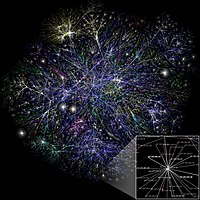
Photo from wikipedia
AIM This study examined the contribution of the social network to one's sense of belonging to the community (SCB) in two different long-term care settings: Continuing care retirement communities (CCRCs)… Click to show full abstract
AIM This study examined the contribution of the social network to one's sense of belonging to the community (SCB) in two different long-term care settings: Continuing care retirement communities (CCRCs) and adult day care centers (ADCCs). METHODS Overall, 245 respondents participated in both waves of the study that were spaced about 1 year apart. RESULTS Results show that constraint in the social network (e.g., being socially invested in a single group of interconnected ties) is particularly detrimental for CCRC residents, but not for ADCC participants. Betweenness, defined as the number of shortest paths that pass through the focal person, was not significantly related to SCB. In addition, the size of the egocentric network, obtained through a name generator of a list of all potentially meaningful individuals identified by respondents, was directly correlated with SCB at follow-up. CONCLUSIONS The findings are discussed in light of differences between the two long-term care settings and the different social network indicators examined in this study.
Journal Title: Journal of community psychology
Year Published: 2019
Link to full text (if available)
Share on Social Media: Sign Up to like & get
recommendations!